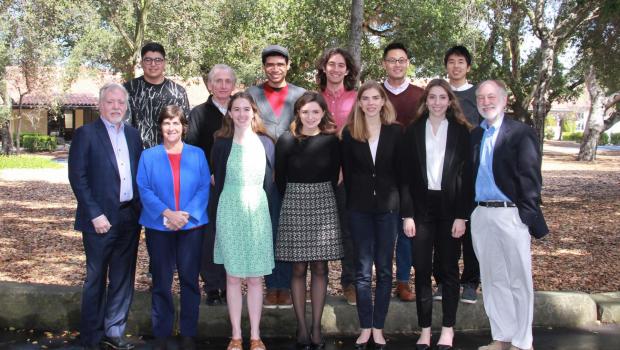 Dean's Award for Academic Achievement
Dean's Award for Academic Achievement
2018 Deans’ Award Winners include students excelling in the creative arts
The Deans’ Award for Academic Achievement, inaugurated in Spring 1988, is given each year to between five and ten extraordinary undergraduate students. These students deserve campus recognition for academic endeavors that might not otherwise be celebrated.
The Deans’ Award honors students for exceptional, tangible accomplishments in the following areas:
- Independent research
- National academic competitions
- A presentation or publication for a regional or national audience
- Superior performance in the creative arts
Students selected for the awards have more than a high grade point average or success in coursework. Outstanding transcripts are usually recognized by honorary societies (Phi Beta Kappa, for example, or Tau Beta Pi). Also excellent honors theses are rewarded with prizes, such as the Firestone or Golden Medals.
This year’s winners include two students excelling in the arts: Carolos Valladares and Matthew K. Yellowtail.
Carlos Valladares is a senior double-majoring in American Studies and with honors in Film and Media Studies. He writes regularly for the San Francisco Chronicle as a film and jazz critic, after working there in the summer of 2017 as a Rebele Internship-funded staff writer. He co-founded and is the editor-in-chief of Untitled, Stanford’s undergraduate art history and film studies journal.
In his junior year, and with the support of Professor Alexander Nemerov and Jason Linetzky, he curated and wrote the wall-texts for Abstraction and the Movies, an exhibition at the Anderson Collection which paired up films with paintings by Abstract Expressionist artists; slated to run for only 3 weeks, it ran for 3 months. Alexander Nemerov calls Carlos, a “one-of-a-kind student” who is “the most natural young scholar of film [he has] ever encountered in 25 years of undergraduate teaching at Yale and at Stanford.”
Drawing upon research funded by the Chappell-Lougee Scholarship, he is writing an honors thesis on acting and ensembles in the films of Richard Lester (A Hard Day’s Night, Help!). He is a research assistant for Dr. Christina Mesa on her upcoming book on black and white race relations in popular American fiction and film. As the Managing Editor of Arts and Life for the Stanford Daily, he writes a regular column on film (especially those playing at the Stanford Theatre) and has interviewed directors such as Kelly Reichardt, Steven Spielberg, Whit Stillman, and Terence Davies. In addition to his outstanding achievements, Professors Shelley Fisher Fishkin, Scott Bukatman, and Marci Kwon, along with Lecturers Judith Richardson and Elizabeth Kessler, commend Carlos for his “rare gift of being able to extend his astute insights into film beyond the classroom to his fellow students and the broader public.”
Matthew K. Yellowtail is a senior majoring in Native American Studies. He is a proud member of the Apsáalooke (Crow) Nation in Montana.
As a freshman, Matthew had the privilege of participating in the first ever Indigenous Digital Storytelling Project. The program, organized by then CAPS counselor Virgil Moorehead, was monumental in helping him understand the role of oral traditions in reshaping Indigenous mental health, as well as challenging the status quo of historical methods and narratives. This program inspired Matthew to further explore the importance of oral tradition, leading him to create and teach his own course under the guidance of Karen Biestman. The class, titled “The Generations Project,” allowed him and his peers to explore the role of digital media in protecting, preserving, and sharing Indigenous oral traditions in an ethical manner.
Professors Tomás Jiménez and Teresa LaFromboise along with Karen Biestman, former director of the Native American Cultural Center, recognize Matthew as “an institutional border crosser, a weaver of tradition and innovation, and an intellectual change agent. His work on ‘The Generations Project’ seeks to preserve tribal oral traditions by harnessing a spectrum of technology tools.”
In addition, Matthew also holds a strong passion for filmmaking. Pursuing honors through the Department of Comparative Studies in Race and Ethnicity, he is currently writing a television series based in his hometown of Wyola, Montana. After graduation, Matthew hopes to pursue a career in filmmaking, creating stories that weave his cultural beliefs into contemporary settings. Above all else, Matthew hopes to increase the visibility of Indigenous voices and to make his community proud.
